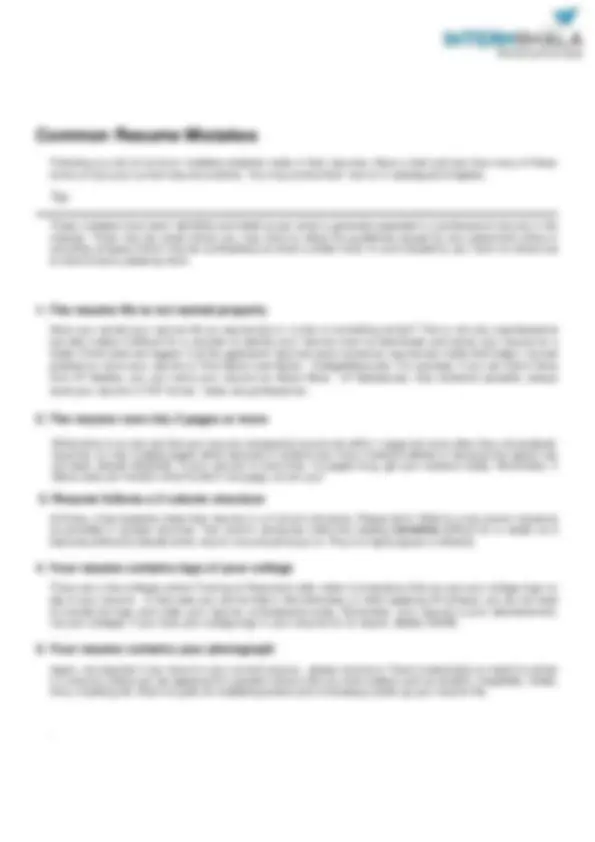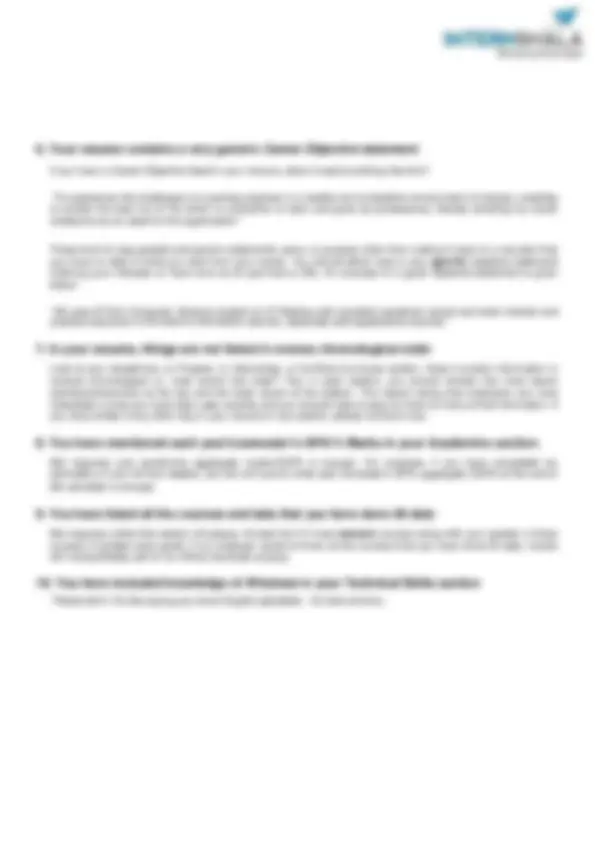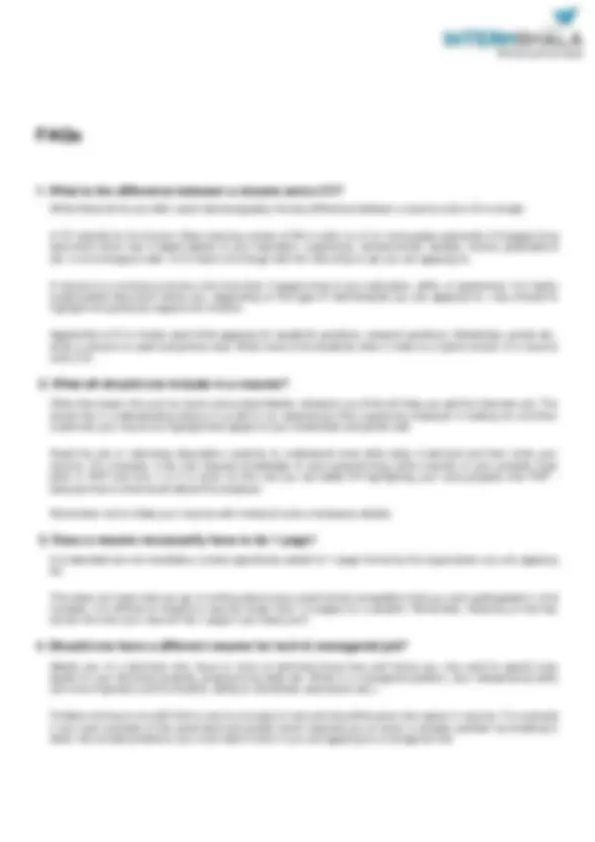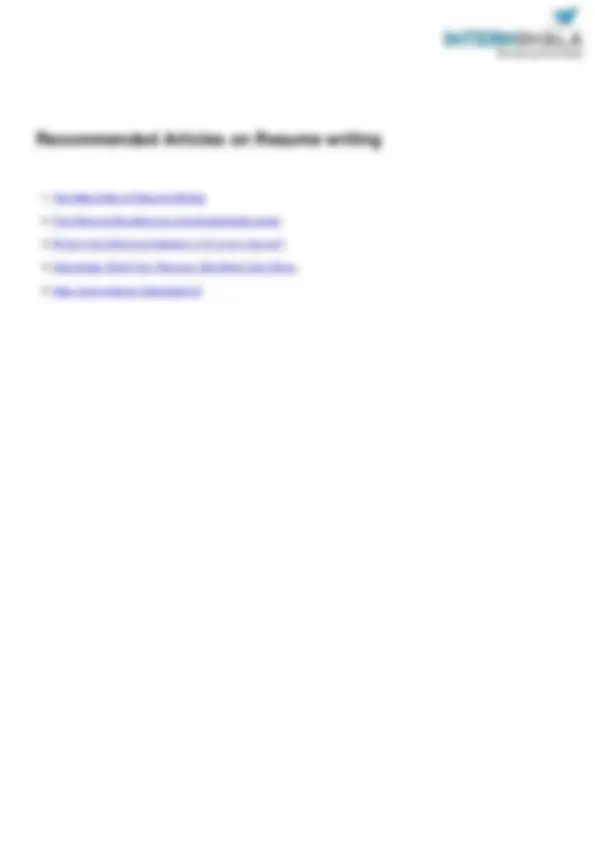






Study with the several resources on Docsity

Earn points by helping other students or get them with a premium plan


Prepare for your exams
Study with the several resources on Docsity

Earn points to download
Earn points by helping other students or get them with a premium plan
Community
Ask the community for help and clear up your study doubts
Discover the best universities in your country according to Docsity users
Free resources
Download our free guides on studying techniques, anxiety management strategies, and thesis advice from Docsity tutors
A comprehensive guide on how to write an effective resume. It covers topics such as the purpose of a resume, important pointers for writing a resume, common mistakes to avoid, and the difference between a resume and a cv. It also includes sample templates and recommended articles for further reading.
What you will learn
Typology: Study Guides, Projects, Research
1 / 8

This page cannot be seen from the preview
Don't miss anything!





A resume is a 1-2 page document that presents your skills and achievements and that you may use to market yourself. The purpose of a resume is to get you an interview call.
A resume should contain short summary of your qualification, experience and other relevant details which should help your recruiter make an assessment of your suitability for the given position.
Before you write anything on your resume just ask yourself if that information will help you get an interview call.
a. Avoid sugar-coated, vague, generic global objective statements. You know you don‟t mean it, the employers know even better b. Objective should be very specific and should be substantiated by the internships/projects done.
Internationally people understand million, billion.
.
If you have a Career Objective listed in your resume, does it read something like this?
"To experience the challenges of a working engineer in a healthy but competitive environment of industry, enabling to extract the best out of me which is conducive to learn and grow as professional, thereby directing my future endeavors as an asset to the organization"
These kind of copy pasted and generic statements serve no purpose other than making it clear to a recruiter that you have no idea of what you want from your career. You should either have a very specific objective statement outlining your interests or have none at all (yes that is OK). An example of a good Objective statement is given below -
"4th year B.Tech Computer Science student at IIT Madras with excellent academic record and keen interest and practical exposure in the field of information security, especially web applications security."
Look at your Academics, or Projects, or Internships, or Co/Extra Curricular section. Does it contain information in reverse chronological i.e. most recent first order? Yes, in each section, you should mention the most recent activity/achievement at the top and the least recent at the bottom. The reason being that employers are most interested in what you have been upto recently and you should make it easy for them to find out that information. If you have written it any other way in your resume in any section, please correct it now.
Not required, just mentioning aggregate marks/CGPA is enough. For example, if you have completed six semesters of your B.Tech degree, you do not have to write each semester's GPA; aggregate CGPA at the end of
Not required, strike that section off please. At best list 2-3 most relevant courses along with your grades in those courses (if grades were good). If an employer wants to know all the courses that you have done till date, he/she will most probably ask for an official transcript anyway.
Please don't. It's like saying you know English alphabets - it's that common.
While these terms are often used interchangeably; the key difference between a resume and a CV is length.
A CV (stands for Curriculum Vitae meaning course of life in Latin) is a 2 or more pages (generally 3-8 pages) long document which has in-depth details of your education, experience, achievements, awards, honors, publications etc. in chronological order. A CV does not change with the internship or job you are applying to.
A resume is a concise summary (not more than 2 pages long) of your education, skills, or experience. It is highly customizable document where you, depending on the type of internship/job you are applying for, may choose to highlight one particular aspect over another.
Apparently a CV is mostly used while applying for academic positions, research positions, fellowships, grants etc., while a resume is used everywhere else. What most of the students write in India is a hybrid version of a resume and a CV.
Other than basic info such as name and contact details, whatever you think will help you get the interview call. The secret lies in understanding what is it (a skill or an experience) that a particular employer is looking for and then customize your resume to highlight that aspect of your credentials and profile well.
Read the job or internship description carefully to understand what skills does it demand and then write your resume. For example, if the role requires knowledge of Java programming while majority of your projects have been in PHP and only 1 or 2 in Java; for this role you are better off highlighting your Java projects over PHP - because that is what would attract the employer.
Remember not to inflate your resume with irrelevant and unnecessary details.
It is desirable but not mandatory (unless specifically asked for 1 page format by the organization you are applying to).
This does not mean that you go on writing about every small school competition that you ever participated in. And honestly, it is difficult to imagine a resume longer than 1.5 pages for a student. Remember, relevancy is the key but do not cram your resume into 1 page if you really can't.
Ideally yes. In a technical role, focus is more on technical know-how and hence you may want to spend more space on your technical projects, programming skills etc. While in a managerial position, your interpersonal skills are more important (communication, ability to coordinate, lead teams etc.).
Problem solving is one skill that is core to any type of role and should be given due space in resume. For example if you have example of this great technical project which required you to solve a complex problem by breaking it down into smaller problems; you must retain it even if you are applying to a managerial role